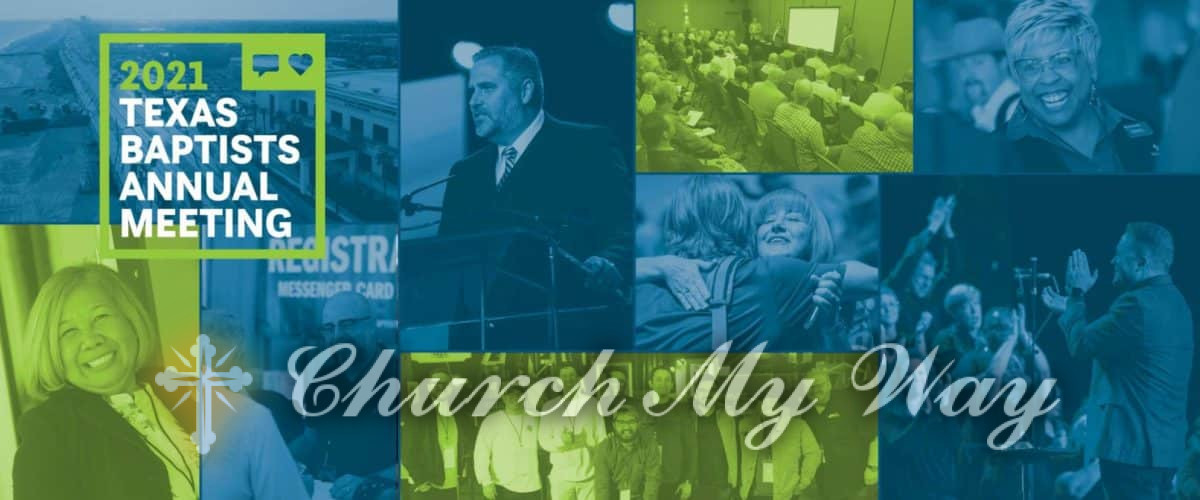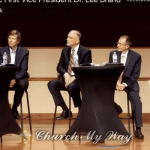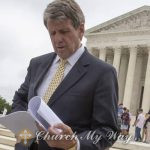Texas Baptists ‘affirm’ women while making gender an article of faith
Texas Baptists ‘affirm’ women while making gender an article of faith
The Baptist General Convention of Texas has “affirmed” women as contributors to God’s work while also adopting a new faith statement that — mixed in with core historic Baptist beliefs — says “gender is a gift from God who creates humankind male and female in the divine image and likeness” and that “biblical marriage (is) one man and one woman in a covenant relationship with the Lord and with one another.”
The Baptist General Convention of Texas has “affirmed” women as contributors to God’s work while also adopting a new faith statement that — mixed in with core historic Baptist beliefs — says “gender is a gift from God who creates humankind male and female in the divine image and likeness” and that “biblical marriage (is) one man and one woman in a covenant relationship with the Lord and with one another.”
The issue of women’s role in church and home is a renewed flashpoint within the Southern Baptist Convention, where the most conservative wing of the denomination is advancing a theology called “complementarianism,” which teaches that men and women are created differently by God for different roles. Complementarians believe only men may serve as pastors and should exercise authority in church and home. Some complementarians will not allow women to teach teenage or adult males in any context.
While the SBC as a whole has declared women serving as pastors to be unbiblical, not all churches or leaders in the SBC believe in male-only authority. Historically, the BGCT has been one of the few state Baptist conventions relating to the SBC that did not propagate a prohibition on women in church leadership.
Historically, the BGCT has been one of the few state Baptist conventions relating to the SBC that did not propagate a prohibition on women in church leadership.
As the SBC faces renewed internal schism between its conservative core and a couple of its more-conservative branches, the pressure to clarify views on women and gender and sexuality are running through other Baptist groups — such as the autonomous state conventions that relate to the SBC through cooperative giving and mission work.
In this context, a was proposed at the BGCT’s annual meeting last week that says: “Whereas, women have served Texas Baptists in numerous and complex ways, which include elected offices, faithful service on committees, local and foreign mission work, positions in higher education, as well as within local churches; whereas, that Texas Baptists continue to affirm and celebrate the contribution of women advancing God’s kingdom. Be it resolved, that the messengers of the 2021 Texas Baptists annual meeting affirm the ongoing efforts of Texas Baptists following Christ’s example of engaging, empowering, and entrusting women with the gospel.”
The role of women in ministry has been a hot issue behind the scenes in Texas Baptist life especially in the last few years. Concerns about women being trained as pastors — along with concerns about acceptance of LGBTQ Christians — reportedly were factors in the recent closing of Logsdon Seminary at Hardin-Simmons University, a school affiliated with the BGCT, although university administrators have blamed only finances.
Truett Seminary at Baylor University — also affiliated with the BGCT — continues to train both men and women equally for pastoral roles but will not place students in field study with congregations that are LGBTQ affirming.


David Hardage
David Hardage, BGCT executive director and a former staff member at Truett Seminary, recently warned the BGCT Executive Board that he is concerned about Baylor soon becoming affirming of LGBTQ inclusion. In part because of pressure from alumni and from current students and in part because of the university’s desire to be recognized as a top-tier research university, Baylor regents and administrators are under intense pressure to find a way to signal more inclusion while not antagonizing the BGCT or conservative Texas Baptists.
In May, while speaking to the Executive Board, Hardage mentioned a resolution approved by the Baylor board of regents that reaffirmed the university’s traditional Statement on Human Sexuality while opening the door to the possibility of a chartered organization to provide care and support for LGBTQ students.
According to the , Hardage reported that he had communicated “thoughts, concerns and ideas to BGCT-elected regents and the administration” at Baylor.
At the same meeting, the Standard reported, Hardage warned “there is a storm brewing,” citing the — a bill in the U.S. Congress that would amend the Civil Rights Act of 1964 to extend protection based on sexual orientation and gender identity — along with some litigation involving Christian colleges and universities regarding issues of human sexuality.
In September, the BGCT Executive Board adoption of a new faith statement called GC2 — a reference to the Great Commission and the Great Commandment found in the New Testament. The recommendation explained: “The need exists for a big-tent approach to missions and ministry that affirms the historic truths of Scripture and Baptist distinctives. This organic movement has created an opportunity for Texas Baptists to lead the way in offering a new vision for collaboration: the GC2 Movement.”
A BGCT news report explained that the faith statement “is not intended to take the place of any other faith statements, but instead serves as a guide for collaboration with like-minded conventions, denominations, churches, ministries, foundations, institutions or Christians.” Instead, it would “act as a summary of the convention’s core beliefs.”
Although the convention in session does not appear to have voted on adoption of this new faith statement, messengers to this year’s annual meeting did vote to amend it by adding a statement about Jesus’ ascension.
Although the convention in session does not appear to have voted on adoption of this new , messengers to this year’s annual meeting did vote to amend it by adding a statement about Jesus’ ascension.
At an annual meeting promoting the larger GC2 vision, Hardage said: “When people think of us, I want them to think, ‘That’s the group that focuses on loving God and loving others and making disciples.’”
The differs from previous statements of faith adopted by the BGCT and most other state Baptist conventions because it mixes historic Baptist beliefs with current political and social issues.
It affirms 12 beliefs:
- “There is one God who is revealed in three persons: God the Father, God the Son, and God the Holy Spirit.”
- “Jesus Christ is the head of the church.”
- “The virgin birth of Christ, the eternal Son of God, who died for our sins, was resurrected on the third day, and is coming back.”
- “The Bible is God’s word and truth without mixture of error.”
- “Salvation is by grace alone, through faith alone, in Christ alone.”
- “The priesthood of every believer and of all believers.”
- “The urgent need to reach the lost with the good news of Jesus.”
- “The sanctity of human life from conception to natural death.”
- “Gender is a gift from God who creates humankind male and female in the divine image and likeness.”
- “Biblical marriage as one man and one woman in a covenant relationship with the Lord and with one another.”
- The ordinances of the church are the Lord’s Supper and believer’s baptism.”
- “The autonomy of the local church in governance and ordination.”
A different set of bullet points appears on the BGCT’s “” page on its website. What is not shown is any version of the Baptist Faith and Message, the SBC’s doctrinal statement. It was the revision of this statement in 2000 that was the final straw for some moderate Baptist churches disenchanted with the SBC’s rightward shift. Initially, the BGCT retained affirmation of the 1963 version of the Baptist Faith and Message.
What is not shown is any version of the Baptist Faith and Message, the SBC’s doctrinal statement.
On a downloads page on the convention’s website, the following note appears about confessions of faith: “The 1963 Baptist Faith and Message has been adopted by messengers to the BGCT annual meeting. Some BGCT churches use other confessions of faith, including the 2000 Baptist Faith and Message. Neither confession of faith is a requirement for inclusion in the BGCT.”
The new GC2 faith statement, however, has been described as an essential outline of belief parameters for anyone who wants to cooperate with the BGCT.
While other Baptist bodies — including most of the SBC’s six seminaries — also have added statements of faith regarding gender and marriage, they have done so by adding other existing statements created by groups such as the Council on Biblical Manhood and Womanhood. Some of the SBC seminaries now have as many as four distinct statements of faith that faculty members must affirm annually.
In 2015, the BGCT Executive Board that “in the Bible, gender is based on biological attributes and is seen as a gift from God and immutable.” The action was taken in relation to some BGCT-affiliated schools seeking exemptions from federal Title IX regulations requiring equal treatment of all students regardless of sexual orientation or gender identity.
Related articles:
| Opinion by Laura Ellis
| Opinion by Rob Sellers



